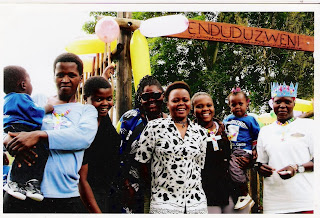it was painful to pass these children. to know the work i was doing with children orphaned by hiv was important and necessary, but to still pass these hungry, left-alone children with scabies under their skin who were fortunate enough to still have a parent. my housemate and i could not keep doing nothing. we knew the organization did not have the capacity at that time to establish any long-term solution. but we knew we couldn't keep walking past, doing nothing. so on saturday afternoons, we toted tins of grapefruit and a dysfunctional can opener into their neighborhood and would play with these kids:
we were a band-aid (if that). a desperate attempt to do something, to not close our eyes to what was happening around us. we were limited. we cried and we prayed and we hoped that someday things would be different for these kids. an answer to those prayers came shortly after i left swaziland: a woman from the uk came to bulembu to set up a care center for those very children that had evoked my tears and worry and food and prayers for so many months:
it is called enduduzweni, which means "place of comfort."
my friend zandi works there now. the care center has grown over the past 5 years, and it now expanding to include baby care. i am told that zandi does an amazing job, that she has a gift for working with children. i knew that though.
i know that love poured out during the day doesn't negate neglect at night. that tummies filled at lunch time may not be filled again until the next morning. that moms who build loving families and still get hiv from dads who work in the big cities. that summer floods wash away roads and houses and crops and threaten a precarious economy.
but it is still a story of hope. of tummies now filled during lunch that would have otherwise been hungry. of kids left alone on doorsteps while their moms work now with safe places to play and learn and be cared for. of people choosing to offer love despite struggle and suffering and cost. i know what was, and what is now. and it gives me hope.
i know that the story of these children is not over. the story of edudzuweni is not over. the story of swaziland is not over. and so again, still, we wait for hope to come true.
"for there is still a vision for the appointed time;
it speaks of the end, and does not lie.
if it seems to tarry, wait for it;
it speaks of the end, and does not lie.
if it seems to tarry, wait for it;
it will surely come, it will not delay." - habbakuk 2:3
(ps - if you want to give to enduduzweni, click here. it costs US$150 a day to run the center - which feeds 100 children, pays the salaries of 8 caregivers and cooks, and assists vulnerable children with medical care and school fees.)







No comments:
Post a Comment